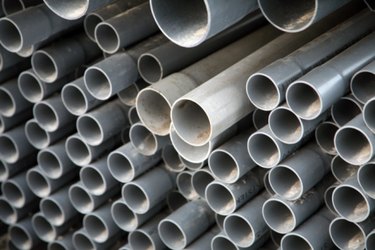
Modern construction methods use Polyvinyl Chloride, commonly referred to as PVC, and metal pipes for pipe needs. The European PVC Industry says that Polyvinyl Chloride is the plastic most often used worldwide. Both PVC and galvanized metal are reliable materials that pose challenges when the need for applying an adhesive arises. Solvent cements used for PVC pipes should be checked against the type of PVC being repaired. Likewise, when gluing galvanized metal pipes, the details of the structural adhesive used for pipe repair should be read to ensure the adhesive is intended for the use of the damaged metal pipe.
Solvent Cement for PVC Pipes
Video of the Day
PVC pipes are joined by the use of a chemical solvent. "This Old House" magazine says that this solvent actually permeates the PVC and then melts the polyvinyl chloride's surface together. Solvent cement can be used for all three types of PVC, but the cement must be intended for the specific type of PVC that is being glued. The Plastic Pipe and Fittings Association details the three types of PVC as: Polyvinyl Chloride, Chlorinated Polyvinyl Chloride and Acrylonitrile-Butadiene-Styrene. PVC and Acrylonitrile-Butadiene-Styrene are used in plumbing and venting situations and Chlorinated Polyvinyl Chloride is used externally and below ground for sprinklers and main water lines. Solvent cements should be applied in the temperatures suggested by the brand and type of cement being used. PVC pipes intended for indoor use will require solvent cement that is intended for warmer temperatures than for PVC pipes used outdoors. Solvent cements are sold under many brands and usually come in a can with an applicator for easy use.
Video of the Day
Structural Adhesives for Galvanized Metal Pipes
Galvanized metal pipes should be glued with a structural adhesive intended for bonding galvanized steel, aluminum, stainless steel and composite metals. Structural adhesive is a two-part epoxy that must be mixed together to activate the adhesive and then applied to the metal pipe surface. The adhesive may be applied on vertical or horizontal pipe surfaces. Welding Design & Fabrication website reports that studies have concluded that repairs made with two-part structural adhesives to metal pipes have been successful for up to 50 years. Structural adhesives, sometimes referred to as acrylic structural adhesives, are available from building and construction supply stores.
Structural Adhesives for PVC or Galvanized Metal Pipes
Just like structural adhesives glue galvanized metal pipes, there are structural adhesives that will effectively glue many grades of plastics as well as metals. Not all structural adhesives are intended for gluing Polyvinyl Chloride and not all structural adhesives are intended for gluing metals. It is important to carefully read the product details to make sure that the pipe you intend to glue (and the pipe's uses) falls within the range of that particular structural adhesive. D.J. Dunn, in the book, "Engineering and Structural Adhesives," reports that there are many two-part epoxy adhesives that successfully bond with plastics and metals. Most of these adhesives require up to 24 hours to reach full strength.
- European PVC Industry: What is PVC?
- This Old House: Gluing PVC Pipe
- The Plastic Pipe and Fittings Association: Cement Products FAQ
- Welding Design & Fabrication: Making Joints with Structural Adhesives
- Google Books: Engineering and Structural Adhesives By D. J. Dunn
- Free Patents Online: Structural Adhesives Containing Maleimide Terminated Polyimides
- Plastipedia: The Web's Largest Plastics Encyclopedia